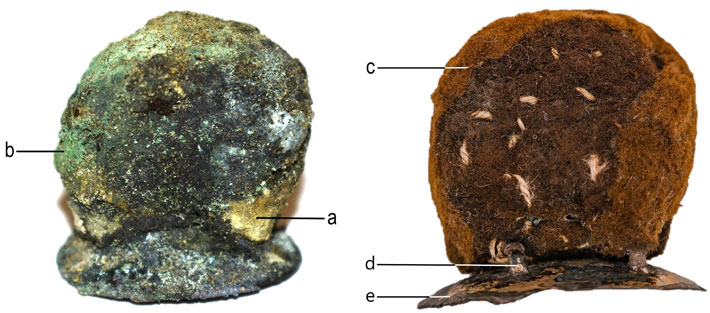 KRAKOW, POLAND—Live Science reports that an eighteenth-century palatal obturator has been found with the remains of a man with a cleft palate who was buried in a crypt at the Church of St. Francis of Assisi in Krakow in the eighteenth century. The prosthesis measures about an inch long and consists of a woolen pad sewn to a metallic plate that would have fit into his nasal cavity and blocked substances in the mouth from entering it. The wool pad is thought to have been coated in silver iodide and then covered with a thin sheet of copper and then gold and silver, based upon analysis with a scanning electron microscope and energy dispersive X-ray spectroscopy. The device would have also helped the man to swallow, breath, and talk, explained Anna Spinek of the Hirszfeld Institute of Immunology and Experimental Therapy. Read the original scholarly article about this research in Journal of Archaeological Science: Reports. To read about the burial of a sixth-century Lombard warrior who appears to have worn a prosthetic arm, go to "Late Antique TLC."
KRAKOW, POLAND—Live Science reports that an eighteenth-century palatal obturator has been found with the remains of a man with a cleft palate who was buried in a crypt at the Church of St. Francis of Assisi in Krakow in the eighteenth century. The prosthesis measures about an inch long and consists of a woolen pad sewn to a metallic plate that would have fit into his nasal cavity and blocked substances in the mouth from entering it. The wool pad is thought to have been coated in silver iodide and then covered with a thin sheet of copper and then gold and silver, based upon analysis with a scanning electron microscope and energy dispersive X-ray spectroscopy. The device would have also helped the man to swallow, breath, and talk, explained Anna Spinek of the Hirszfeld Institute of Immunology and Experimental Therapy. Read the original scholarly article about this research in Journal of Archaeological Science: Reports. To read about the burial of a sixth-century Lombard warrior who appears to have worn a prosthetic arm, go to "Late Antique TLC."
300-Year-Old Medical Prosthesis Found in Poland
